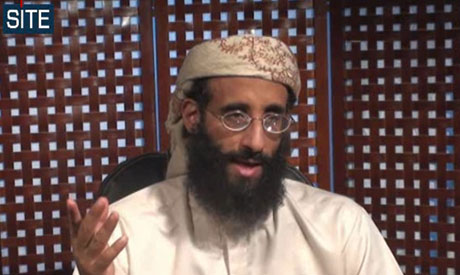
In this Nov. 8, 2010 file image taken from video and released by SITE Intelligence Group on Monday, Anwar al-Awlaki speaks in a video message posted on radical websites. U.S. intelligence indicates that al-Awlaki has been killed in Yemen. (AP Photo/SITE Intelligence Group, File)
Legal US experts say that the killing of high-profile Al-Qaeda cleric Anwar Al-Awlaki by a US drone strike in Yemen is highly questionable under the United States Constitution.
Anwar Al-Awlaki, who was born in New Mexico and has been linked to al Qaeda's Yemen-based wing, was killed by a CIA drone strike in a remote Yemeni town, U.S. authorities said.
"The fact that (Al-Awlaki) was a dual U.S.-Yemeni citizen means that he had extra protections under the U.S. constitution than he would not have had if he was just a Yemeni citizen," said Mary Ellen O'Connell, an international law professor at the University of Notre Dame's law school. "So the president has done something in my view that is highly questionable under our own Constitution."
Al-Awlaki, who lived in Virginia before leaving the United States shortly after Sept. 11, 2001, was the first U.S. citizen who the White House authorized U.S. agencies to kill since the Al-Qaeda attacks on New York and Washington a decade ago.
U.S. officials said Al-Awlaki took a leadership role in Al-Qaeda in the Arabian Peninsula, and was involved in failed terrorist attacks on U.S. targets. He also had contacts with a military psychiatrist accused of carrying out a deadly shooting rampage that killed 13 people in 2009 at the Fort Hood army base in Texas.
Targeted Killing
Under the Obama administration, the United States has stepped up its use of drone strikes to target alleged terrorists. In a speech last year, U.S. Department of State legal adviser Harold Koh defended the targeting of individuals, which he said complied with all "applicable law, including the laws of war."
Koh said that a "state that is engaged in an armed conflict or in legitimate self-defense is not required to provide targets with legal process before the state may use lethal force."
"Our procedures and practices for identifying lawful targets are extremely robust, and advanced technologies have helped to make our targeting even more precise," he said.
A former U.S. national security official said that a drone strike can be launched against someone who is on the target list by relatively low-level officials -- senior officers in the CIA's Counter-terrorism Center. When someone on the list is in the sights of a drone, there is no requirement that the CIA director, or even the head of the National Clandestine Service, personally sign off on pressing the button, the source said.
But before Al-Awlaki's name was placed on the target list, the CIA sent it to the White House for approval because he was a U.S. citizen, the source said.
"As we've seen today, it's a program under which U.S. citizens far removed from the battlefield can be executed by their own government without judicial process and on the basis of standards and evidence that are secret," said Jameel Jaffer, deputy legal director for the American Civil Liberties Union.
Last year, the ACLU and other civil liberties groups representing Al-Awlaki's father lost a challenge to halt the Obama administration's program to capture or kill American citizens who join militant groups abroad.
U.S. District Judge John Bates in Washington dismissed the case because he said the father lacked standing to bring the case and the court lacked jurisdiction over such a political case. However, he did not address the merits of the case and said it raised "vital considerations of national security and military and foreign affairs."
Killing Justified
Some international law experts said that Al-Awlaki's killing appeared to be on strong legal ground. Robert Chesney, a professor at the University of Texas School of Law, agreed Al-Awlaki had rights under the U.S. constitution, but he said that other circumstances justified the government's actions.
Because the government had evidence that Al-Awlaki posed an operational threat -- as opposed to just being a vocal supporter of terrorism -- and because there was no real likelihood that Al-Awlaki could be arrested, the United States had a legal right to take action, Chesney said.
"The million dollar question is: does the killing of Al-Awlaki mean that the government can kill any American at any time if they claim they have intelligence showing the person is a terrorist?," he said. "The answer is, no, I don't think it shows that all."
But other experts said the government should have tried to arrest Al-Awlaki and bring him to a U.S. court. The flouting of the law on the heels of the Middle East's Arab Spring set a bad example for the region, said O'Connell of Notre Dame.
O'Connell said that, in contrast to the killing of Osama bin Laden -- which she said appeared to follow international law -- the Al-Awlaki killing did not.
"It's ironic to me that bin Laden, so much worse as far as we know than Al-Awlaki, gets a treatment that's closer to the rule of law than Al-Awlaki," she said.
Short link: